Exhaust Manifold Replacement Left
Removal Procedure
- Remove the air cleaner outlet duct from the throttle body. Refer to Air Cleaner Outlet Duct Replacement in Engine Controls.
- Remove the air cleaner assembly. Refer to Air Cleaner Assembly Replacement in Engine Controls.
- Disconnect the engine coolant temperature (ECT) gauge sensor electrical connector.
- Remove the intermediate steering shaft.
- Disconnect the exhaust gas recirculation (EGR) valve inlet pipe from the exhaust manifold.
- Remove the radiator inlet hose support bracket and nut.
- Raise the vehicle. Refer to Lifting and Jacking the Vehicle in General Information.
- Disconnect the exhaust pipe from the exhaust manifold. Refer to Exhaust Manifold Pipe Replacement in Engine Exhaust.
- Lower the vehicle to the proper height.
- Remove the front tire to gain access to the rear exhaust manifold bolts. Tire and Wheel Removal and Installation in Tire and Wheels.
- Remove the fender wheelhouse extension.
- Disconnect the spark plug wires from the spark plugs. Refer to Spark Plug Wire Harness Replacement in Engine Electrical.
- Remove the nuts holding the secondary air injection (AIR) pipe to the exhaust manifold, if equipped.
- Remove the AIR pipe and gasket from the exhaust manifold.
- Remove the exhaust manifold bolts and the stud.
- Lower the vehicle.
- Remove the exhaust manifold and the spark plug wire shields from the engine.
- Clean all gasket surfaces. Refer to Exhaust Manifold Cleaning and Inspection ,
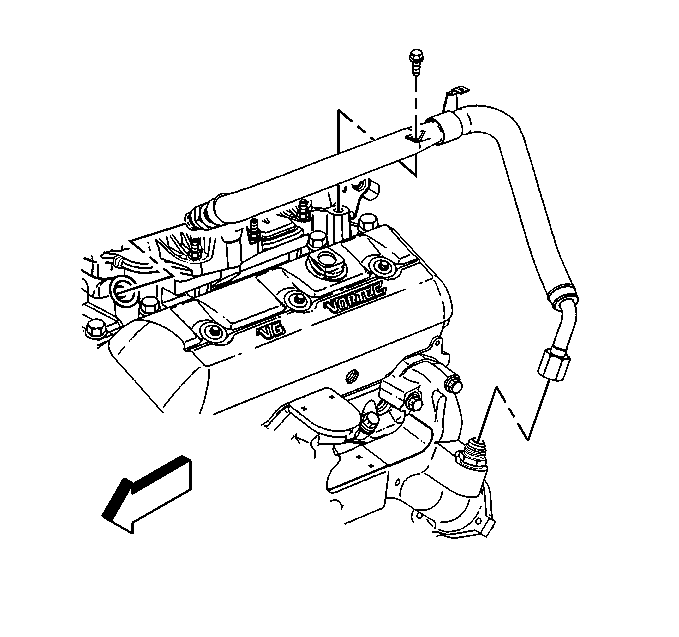
| • | Refer to Lower Intermediate Steering Shaft Replacement in Steering Wheel and Column - Standard. |
| • | Refer to Lower Intermediate Steering Shaft Replacement in Steering Wheel and Column - Tilt. |
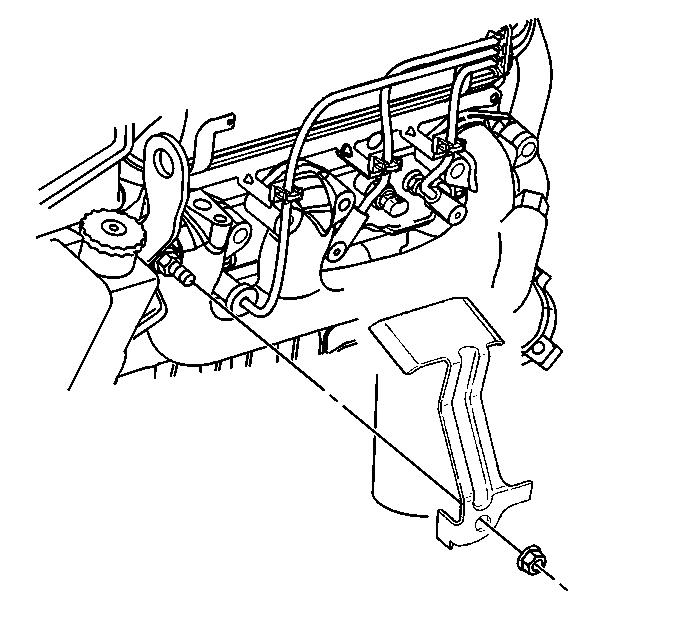
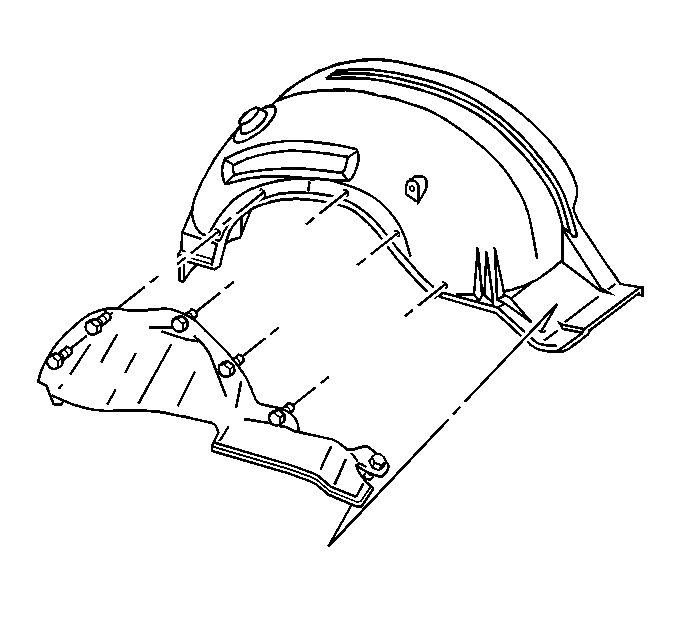
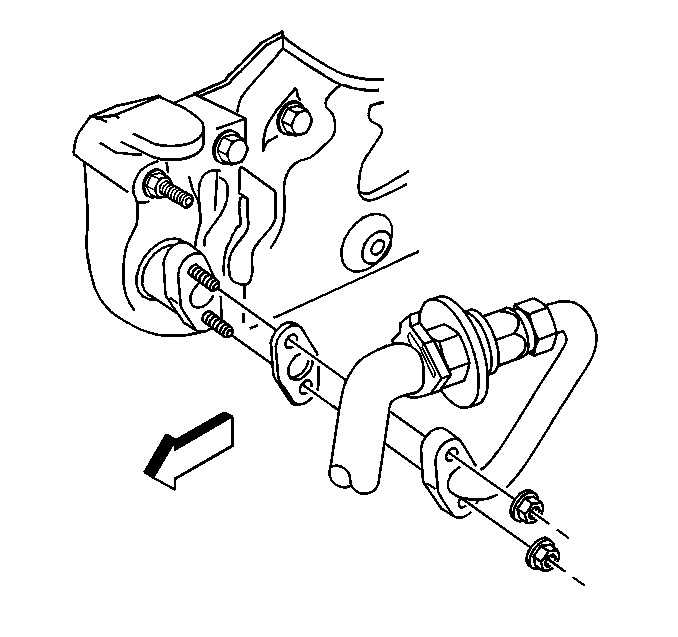
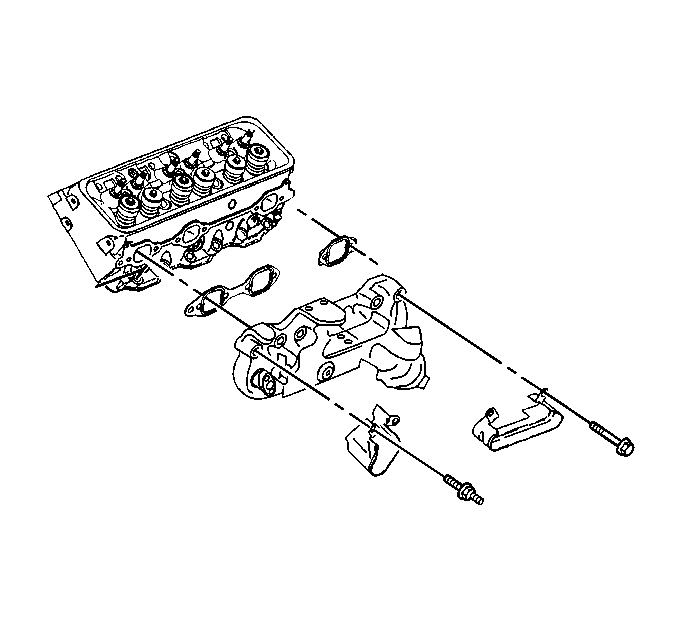
Installation Procedure
- Sub-assemble the spark plug wire shields, bolts, and NEW gaskets to the exhaust manifold.
- Raise the vehicle to the proper height.
- Install the exhaust manifold to the engine. Refer to Exhaust Manifold Installation .
- Connect the spark plug wires to the spark plugs. Refer to Spark Plug Wire Harness Replacement in Engine Electrical.
- Install the fender wheelhouse extension.
- Install the front tire. Refer to Tire and Wheel Removal and Installation in Tire and Wheels.
- Install the AIR pipe and a NEW gasket to the exhaust manifold, if equipped.
- Install the AIR pipe nuts.
- Raise the vehicle.
- Connect the exhaust pipe to the exhaust manifold. Refer to Exhaust Manifold Pipe Replacement in Engine Exhaust.
- Lower the vehicle.
- Install the radiator inlet hose support bracket and nut.
- Connect the ECT gauge sensor electrical connector.
- Connect the EGR valve inlet pipe to the exhaust manifold.
- Install the intermediate steering shaft.
- Install the air cleaner assembly. Refer to Air Cleaner Assembly Replacement in Engine Controls.
- Install the air cleaner outlet duct to the throttle body. Refer to Air Cleaner Outlet Duct Replacement in Engine Controls.

The stud installs in the front hole.


Notice: Use the correct fastener in the correct location. Replacement fasteners must be the correct part number for that application. Fasteners requiring replacement or fasteners requiring the use of thread locking compound or sealant are identified in the service procedure. Do not use paints, lubricants, or corrosion inhibitors on fasteners or fastener joint surfaces unless specified. These coatings affect fastener torque and joint clamping force and may damage the fastener. Use the correct tightening sequence and specifications when installing fasteners in order to avoid damage to parts and systems.
Tighten
Tighten the AIR pipe nuts to 25 N·m (18 lb ft).

Tighten
Tighten the radiator inlet hose support bracket nut to 36 N·m
(27 lb ft).

Tighten
Tighten the EGR valve inlet pipe exhaust manifold nut to 30 N·m
(22 lb ft).
| • | Refer to Lower Intermediate Steering Shaft Replacement in Steering Wheel and Column - Standard. |
| • | Refer to Lower Intermediate Steering Shaft Replacement in Steering Wheel and Column - Tilt. |
Exhaust Manifold Replacement Right
Removal Procedure
- Raise the vehicle. Refer to Lifting and Jacking the Vehicle in General Information.
- Disconnect the exhaust pipe from the exhaust manifold. Refer to Exhaust Manifold Pipe Replacement in Engine Exhaust.
- Lower the vehicle.
- Remove the bolt for the oil level indicator tube.
- Disconnect the spark plug wires from the spark plugs. Refer to Spark Plug Wire Harness Replacement in Engine Electrical.
- Remove the nuts holding the secondary air injection (AIR) pipes to the exhaust manifold, if equipped.
- Remove the AIR pipe and gasket.
- Remove the exhaust manifold bolts.
- Remove the exhaust manifold and the spark plug wire shields from the engine.
- Clean all gasket surfaces. Refer to Exhaust Manifold Cleaning and Inspection .
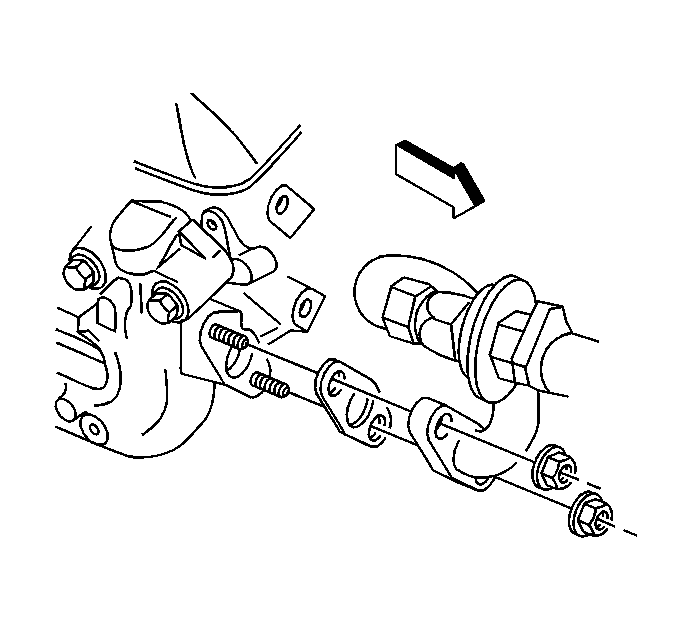
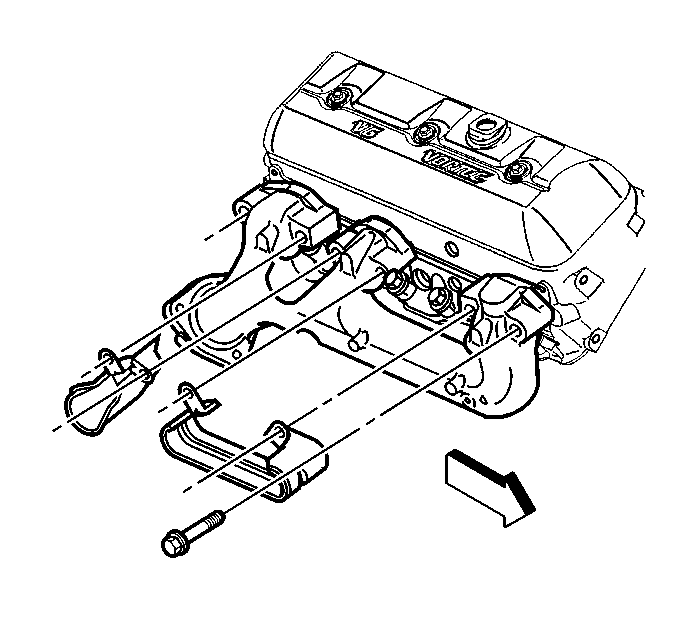
Installation Procedure
- Sub-assemble the spark plug wire shields, bolts, and NEW gaskets to the exhaust manifold.
- Install the exhaust manifold to the engine. Refer to Exhaust Manifold Installation .
- Connect the spark plug wires to the spark plugs. Refer to Spark Plug Wire Harness Replacement in Engine Electrical.
- Install the AIR pipe and a NEW gasket to the exhaust manifold, if equipped.
- Install the AIR pipe nuts.
- Raise the vehicle.
- Connect the exhaust pipe to the exhaust manifold. Refer to Exhaust Manifold Pipe Replacement in Engine Exhaust.
- Lower the vehicle.
- Install the bolt for the oil level indicator tube.


Notice: Use the correct fastener in the correct location. Replacement fasteners must be the correct part number for that application. Fasteners requiring replacement or fasteners requiring the use of thread locking compound or sealant are identified in the service procedure. Do not use paints, lubricants, or corrosion inhibitors on fasteners or fastener joint surfaces unless specified. These coatings affect fastener torque and joint clamping force and may damage the fastener. Use the correct tightening sequence and specifications when installing fasteners in order to avoid damage to parts and systems.
Tighten
Tighten the AIR nuts to 25 N·m (18 lb ft).
Tighten
Tighten the oil level indicator tube bolt to 12 N·m (106 lb in).
